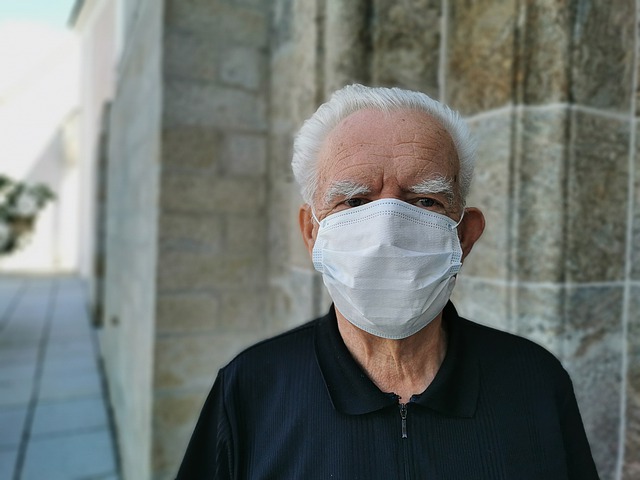The typical flu season runs from October to April and with so much uncertainty surrounding the flu season this year in combination with COVID-19, experts are saying it is more important than ever to get a flu shot. The CDC reported that last year there were up to 56 million flu cases and anywhere from 410,000 to 740,000 hospitalizations.
People 65 years and older account for 70 to 85% of flu related deaths and eight of 10 COVID-19 deaths. With this population at such a great risk, what should they know about Medicare, the flu, and the flu vaccine? Below are some tips for commonly asked questions that we receive at Devoted Health.
What are flu symptoms and how are they different from COVID-19?

Flu symptoms are very similar to coronavirus. These include cough, fever, chills, muscle aches, shortness of breath and fatigue. Symptoms that can occur with COVID-19 that typically do not happen with the flu include loss of taste and/or smell, runny nose, and sore throat. COVID-19 infections typically cause more severe coughs and shaking chills. Influenza typically has more of a rapid onset, whereas COVID-19 may take days or up to 14 days to present with symptoms.
How can seniors protect themselves from the flu this year?
First and foremost, get the Flu shot! We recommend that everyone gets a flu shot unless you are younger than 6 months of age or have a severe, life threatening allergy to the flu vaccine or any ingredient in it.
Additional safety measures to take to avoid getting both the flu and COVID-19 include, avoiding close contact with those who are sick, cleaning and disinfecting high touch surfaces and objects, wearing a mask and limiting exposure to crowds and populated areas. Try to be aware of how much you touch your nose, mouth and eyes because germs spread this way.
If you do happen to get sick, be sure to limit contact with others as much as possible. Cover your nose and mouth with a tissue when you cough or sneeze and wash your hands. Every time you wash your hands, use soap and water for at least 20 seconds. If soap and water are not available, use an alcohol-based hand rub.
How could the flu and COVID-19 impact this year’s hospitalizations among those 65+?
The combination of COVID-19 with the flu season this year increases the burden on our hospital system. There is concern that the combination can overwhelm our hospital facilities. We all need to be especially vigilant in this time to social distance, wear masks and avoid being in contact with people outside of your immediate household.
Will Medicare pay for all flu shots and will you have to wait in line at a crowded office?
Medicare pays for all flu shots if administered by a provider that accepts Medicare payment. If you have Medicare Advantage, it will be covered if the provider is in network. Flu shots are widely available and most pharmacies offer the flu vaccine in addition to your physician’s office. It is always best to call ahead of time to verify the wait time and double check with your provider to make sure all costs will be covered.
When should you consider the high dose vaccine, and will Medicare cover it?
The high dose flu vaccine is only recommended for patients 65 years and older. There is no cost to Medicare beneficiaries if the provider accepts Medicare or if you have a Medicare Advantage plan and the provider is in the plan’s network. As we age, our immune system does not respond as well to vaccines and the high dose vaccine has shown to result in more immunity than the standard flu shot. There may be slightly higher incidence of side effects (sore arm, achiness), however, these are not severe. The CDC has not indicated a preference of one vaccine over the other. We recommend talking to your doctor to see if they recommend the high dose vaccine.
Can you get the flu from the flu vaccine?
The flu vaccine for adults is made with inactivated viruses or with a single protein from the flu virus, therefore the vaccine cannot give the patient influenza
If you start to present any symptoms of COVID-19 or the flu, it is important to contact your doctor immediately and limit your exposure to other people to avoid infecting them. Be sure to contact your Medicare provider if you have any questions regarding your coverage and costs associated with the flu vaccine.
Dr. Brian Riveland is the Arizona Medical Director at Devoted Health, a next-generation Medicare Advantage plan guided by a deep belief that every member should be treated like we would treat our own family: with loving care, a profound commitment to their health and well-being, and respect for them and their time. As a “payvidor” that integrates being both a payor and provider of health care services, Devoted Health partners with top doctors and hospitals, uses industry-leading technology, and supports members with dedicated guides and tech-enabled care services in order to help Medicare beneficiaries get the highest-quality health care — the right care in the right place at the right time. Led by co-founders Ed and Todd Park, Devoted Health is powered by a proven, world-class health care and technology team. For more information, go to www.devoted.com




